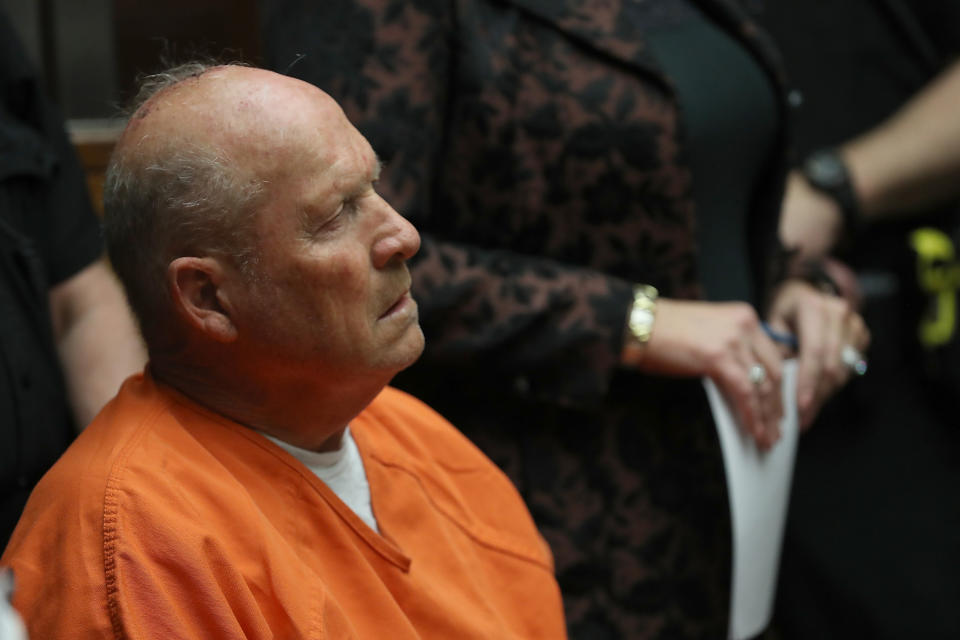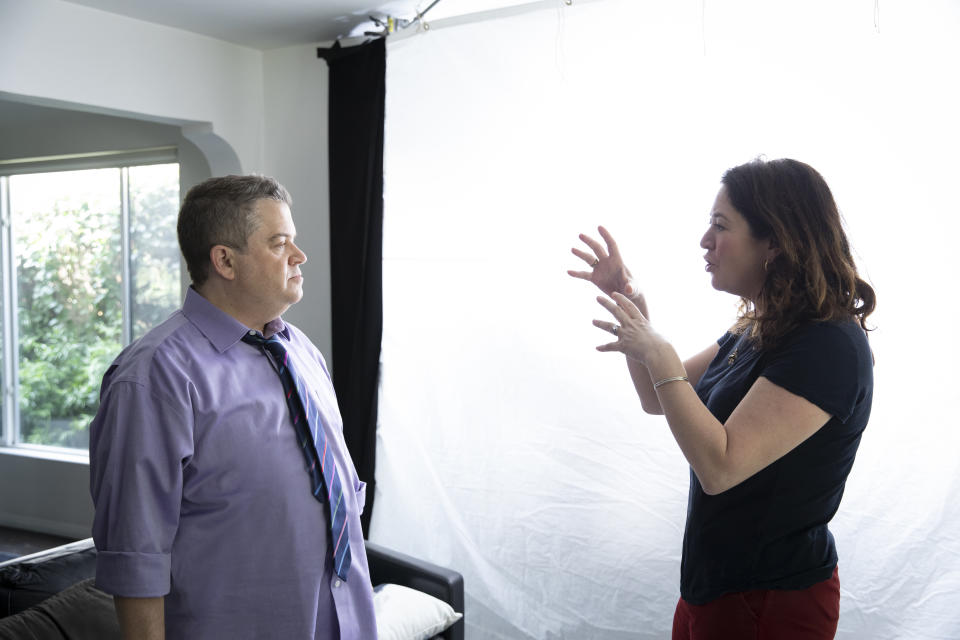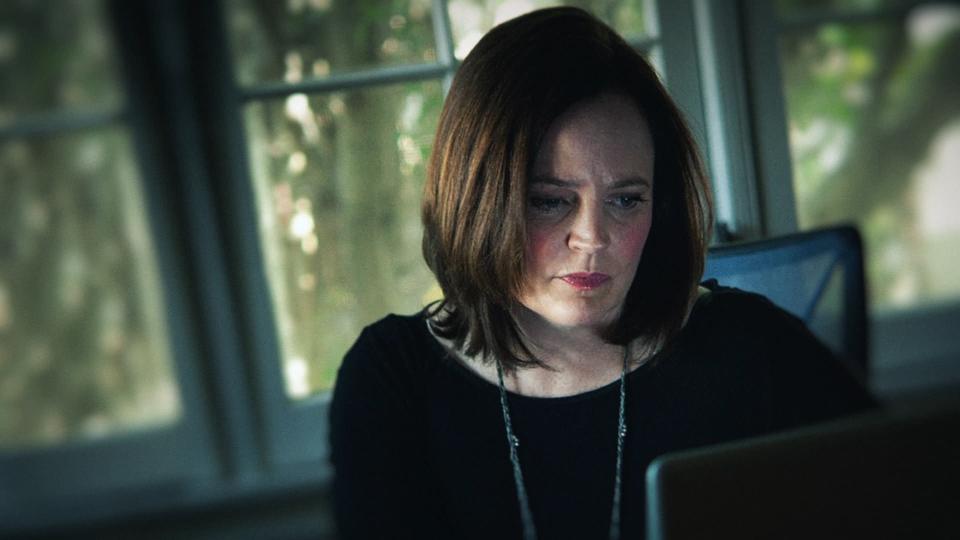Patton Oswalt reflects on 'I'll Be Gone in the Dark' and Michelle McNamara's accidental overdose: 'There were signs that I didn't know to look for'
I’ll Be Gone in the Dark chronicles the decades-long manhunt for California’s notorious Golden State Killer, which finally ended in 2018 when authorities charged Joseph James DeAngelo with a long list of rapes and murders committed between 1974 and 1986. But the HBO docuseries is first and foremost the story of celebrated true crime author, Michelle McNamara, who came close to cracking the case in the pages of the posthumously published book that the series is based on. McNamara died suddenly in 2016 — two years before DeAngelo’s arrest — and her husband, comedian and actor Patton Oswalt, frankly addresses the circumstances of her passing in the series, acknowledging that she developed an opioid addiction that she kept hidden from her family. “Her addiction was obviously something that I absolutely did not understand,” he tells Yahoo Entertainment now. “There were signs that I didn’t know to look for.”
As the series outlines, McNamara came to rely on prescription medications like Xanax and fentanyl as a way to alleviate the pressure of writing a book that explored such dark crimes. “Michelle took on an enormous amount,” says I’ll Be Gone in the Dark director, Liz Garbus, who adapted McNamara’s work into the six-part series. “She was being asked to reflect on herself and her own journey, and she also felt a huge responsibility to find this guy. There’s always this feeling, like, ‘I can get through it, I can get through it,’ but you can’t just bury everything and cope.” As Oswalt has recounted in other interviews, McNamara took Xanax the night before her death, and passed away sometime the following morning, after he had already woken up. Autopsy reports later revealed that she had multiple prescription medications in her system, as well as a previously undiagnosed heart condition.

“The overall theme of the show is that all of us have our demons that we want to keep buried,” Garbus says of how she wanted to approach McNamara’s passing in the series. “And I think that society wants women to suppress a lot of this stuff, which makes it impossible to move forward. So I thought it was important to address [Michelle’s addiction] head on, because it’s not a rare thing and also it de-stigmatizes it. Shame and secrecy is something that, as a filmmaker, I want to counteract.”
Four years after McNamara’s death, Oswalt — who married actress Meredith Salenger in 2017 — says it’s “frustrating” that he missed the signs of her addiction. “Now there are things that I hope I’ll be able to recognize if they ever come up with my friends or family members, and I can do something,” he says. “But at the time, I just didn’t know.” At the same time, he’s hesitant to offer advice to others who suspect one of their family members is hiding an opioid addiction. “Just because each person’s addiction is different and unique, I would say go talk to a professional rather than me. I’m just a comedian, so please talk to someone who knows.”
With DeAngelo’s next court appearance set for June 29, one day after I’ll Be Gone in the Dark premieres on HBO, Yahoo Entertainment spoke with Garbus and Oswalt about the future of the case, and the importance of what McNamara left behind.
Yahoo Entertainment: Liz, you have a unique opportunity with the series in continuing the story past where Michelle’s book ends with the discovery of Joseph DeAngelo. How did you approach that material?
Liz Garbus: When we started working on the series, we did not know the name Joseph DeAngelo — Michelle was unfortunately not around for his arrest. The crazy thing is that on the first day of filming, I went to Chicago to film a book reading with Patton and meet Michelle’s family for the first time. That night, DeAngelo was arrested, and we learned about him along with the rest of the world. But in many ways, the series is not about him: It’s about the survivors, what they went through, the evolving nature of how rape is dealt with and, of course, Michelle and her journey. So that’s the focus of the first five episodes, but once you know this man’s name, you have to ask — what can we learn about him? And when you start to learn about him, you see that he is a very damaged, sad soul. That’s something we were curious to explore.
Patton, what do you think Michelle would have thought when she saw DeAngelo in court? And would she have wanted to attend every hearing?
Patton Oswalt: See, that's what I love about Michelle: I absolutely could not predict what her reaction would have been. The thing about her was that she always had such a surprising take on anything that it just feels to me it would be reductive to go, “Oh, she would've thought this,” or “She would've felt this.” I don't know what she would have thought, but it would have been something totally unexpected and insightful that would have made me go, “Oh yeah. I didn't think about it that way.” Part of me thinks maybe she would have wanted to be in court, but she might have viewed it as taking focus away from the victims. I'm happy to say that I don't know.

Liz, do you plan to keep following the case as it unfolds and potentially make new episodes as the case against DeAngelo is built in court?
Garbus: I would never say never, but as of now, no. I feel like our journey is complete. We understand that he's intending to plead guilty next week based on media reports. Those could be wrong or could change, of course, but at this point I think we've told the story. And again, the series is really not about him: It’s really about the survivors and Michelle and law enforcement.
When DeAngelo was first arrested, some law enforcement officials played down Michelle’s work to a certain extent. Has that changed?
Garbus: I think that folks like [cold case investigator] Paul Holes who knew Michelle knew what she brought to the case. I mean, he called Michelle his partner. So I think that those who knew Michelle knew what her role was. The fact that we all know him as the Golden State Killer now, and that Michelle was collaborating with law enforcement tells us what we need to know.
Both the book and the series touch on some of the miscues that law enforcement made during the course of the case. As we’re having a national conversation around everyday policing right now, is there also a discussion that should be had about reforming these kinds of investigations?
Oswalt: That is so outside of my wheelhouse. We should listen more to the communities that are being policed rather than seek out our opinion. That’s what I think the problem is: There's not enough listening going on in the community.
Garbus: I totally agree with that. In the series we look at the ways that jurisdictions don't always collaborate, but this is also the kind of crime that’s so rare in terms of what law enforcement does. I don't know what the statistics are nationwide, but I read recently that only 4 percent of crimes in New York are anything like what I’ll Be Gone in the Dark looks like. So I'm not really sure it's analogous to the kinds of police reforms that people are demanding right now. There will always be investigators and law enforcement involved with violent crime. I think what the demands are right now are much more about what the police spend most of their time with, which has nothing to do with this kind of case.

Patton, would Michelle ever express frustration with the way the investigation was handled, and what she might have done?
Oswalt: She was frustrated with how some police investigations were done back in the ‘70s and ‘80s. I think even the cops were frustrated! But I can't remember any specific remedies she had.
Garbus: In her notes, she would talk about the lack of sharing information, and how some jurisdictions would be suspicious of collaborating with others. But Michelle was like a force of good in terms of bringing folks together. She and Patton hosted law enforcement from all different jurisdictions to come together and share information, something they had never done. So she clearly was aware of that and was working to counteract it.
The story takes place against the backdrop of a time of enormous change for women in American society, including the women’s liberation movement of the 1970s. Liz, did you see a connection between what was happening historically and this specific case?
Garbus: Certainly, the way that rape was addressed in the ‘70s from a law enforcement aspect is that it was a misdemeanor in many jurisdictions. And by the way, DeAngelo raped 50 people — that’s an enormous number of women whose lives were permanently disrupted, but rape wasn't seen as such a serious crime. Had it been addressed more seriously, perhaps he would have never gotten to the point of murdering 12 people. So I think there's a lot to look at there, and then also in the attitudes of the survivors themselves: a young teenage girl being taught by a family member to not talk about what had happened to her, or marriages breaking up because there was clearly so much shame. And of course that still happens today. We have a lot of work to do: A lot of people still don't report sexual assaults because they don't believe that they will be fairly tried. That’s an important thing to talk about after watching this series.
You and Michelle both grew up in the ‘70s and ‘80s. Was there anything about her childhood that you related to?
Garbus: Yeah. I really related to Michelle's introspection about her mother and what her mother had given up to be a parent. I similarly had a mother who was working towards a Master's degree, but when she married and had children, she stopped working and you definitely felt that frustration spilling over into the family. It's not good for the mother, it’s not good for anybody in the family to have that unrealized potential. So I certainly related to that in Michelle and her generational differences with her mother.
Patton, what things from Michelle’s life are you passing along to your daughter?
Oswalt: I found a lot of Michelle's poems and short stories, and had them professionally bound by a book binder so I can give them to Alice when she’s older. I also collected the books that Michelle told me really shaped her personality. But I'm also going to back off from Alice in some ways, and let her become the person that she will become. Michelle became the person she became without a lot of parental interference, so I'm not going to try to overly mold who Alice is going to be.

Liz, was there something that Michelle wrote or a specific piece of video footage that helped frame her in your mind while you were working on the series?
Garbus: The interviews she did with investigators and survivors, as well as the videos that she took made me feel optimistic that we could approach the storytelling in a way that made Michelle feel very, very present. Also, all the podcasts she recorded talking about the case allowed her to tell the story as much as possible. And where we didn't have her actual voice, we had writings that Amy Ryan brought to life in voiceover. That really shaped how we approached the story.
Patton, is there are a piece of footage that’s really stayed with you?
Oswalt: There are certain bits of video and photos that I saw in the documentary that were very surprising to me. But that's my business — I’m going to keep that to myself.
I’ll Be Gone in the Dark premieres on Sunday, June 28 at 10 p.m. on HBO.
Read more from Yahoo Entertainment:

